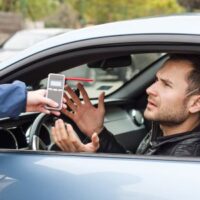Can You Refuse a Field Sobriety Test in Miami?

When a police officer suspects someone of drunk driving, the officer will often ask the suspect to take one or more “field sobriety tests.” For example, the officer will instruct the suspect to close their eyes, tilt their head back, and attempt to touch their nose with one finger. If the suspect has difficulty performing these tasks, the officer may interpret that as a sign of possible intoxication.
Although many scientific studies have questioned the reliability of field sobriety tests, they remain a popular tool to justify DUI arrests in Florida. A common question we get is, “Can I refuse to take the test?” The answer to that is somewhat complicated, especially since there is a tendency to confuse field sobriety tests with chemical tests–such as Breathalyzers–used to establish a DUI suspect’s blood-alcohol content (BAC).
Refusing a Field Sobriety Test
In recent years, Florida appellate courts have taken the position that when a police officer has “reasonable suspicion” that a driver is operating a vehicle under the influence of alcohol or drugs, the officer may require the driver to submit to one or more field sobriety tests. The officer does not have to obtain the driver’s consent for Fourth Amendment purposes. This means that if the driver refuses, that refusal could be used as evidence against them in a criminal DUI trial.
“Reasonable suspicion” is itself a very low bar for a police officer to meet. It is less than the “probable cause” threshold for an arrest, or the “beyond a reasonable doubt” standard necessary for conviction. Essentially, reasonable suspicion requires the officer to observe some behavior that is consistent with drunk driving. For instance, if an officer sees a driver weaving in and out of traffic erratically, that would create reasonable suspicion to initiate a traffic stop. If during the stop the officer smells alcohol on the driver’s breath, that would create reasonable suspicion of DUI to justify requiring a field sobriety test.
Field Sobriety Tests and Florida’s “Implied Consent” Law
While refusing a field sobriety test can lead to your arrest on DUI charges, it will not automatically trigger a suspension of your driver’s license. Florida’s “implied consent” law imposes such penalties in cases where a driver refuses a blood, breath, or urine test following a lawful arrest on suspicion of DUI. In such cases, the arresting officer is required to warn the suspect of the consequences of a refusal. But the Florida implied consent statute does not extend to a refusal of a field sobriety test.
Contact a Miami Criminal Defense Attorney Today
If you have been charged with drunk driving in Miami, you may have grounds to challenge the basis for your arrest, including an improperly administered field sobriety test. Our Miami Miami criminal attorney can review your case and advise you of your options. Contact AsiliA Law Firm today to schedule an initial consultation with a member of our team.
